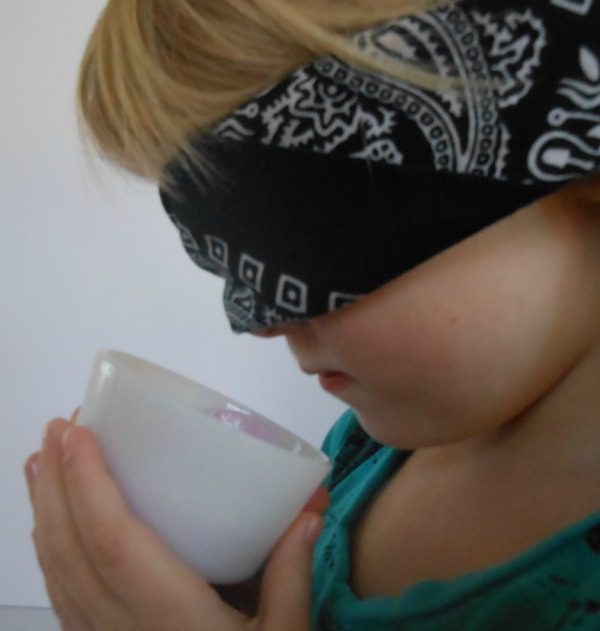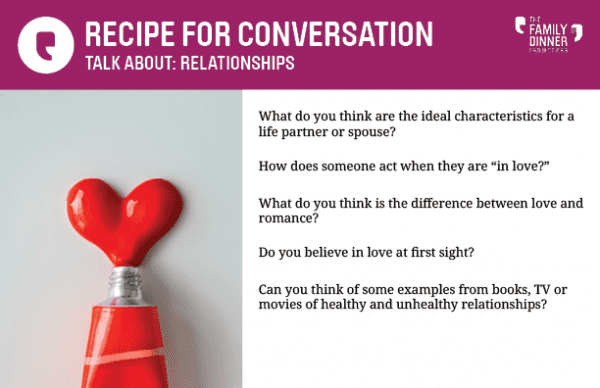Newsletter: February 2019
Building Healthy Relationships at the Table

One of the dates we most associate with the month of February is Valentine’s Day. But this month is also Teen Dating Violence Awareness Month. That may not sound like a fun topic to bring up at the table, but we believe that celebrating love on February 14th and having a dialogue with your family about how to encourage and engage in healthy dating relationships can go hand-in-hand. The trick, especially with wary teens and tweens, is to get things started and then let them take the lead on how deep the conversation goes. And even if you have younger kids and don’t have dating and romance on your radar yet, you can still work on building some strong foundations for the future at your dinner table. Here are some tips to help guide you in using family dinner as a place to encourage healthy relationships:
- Model respect. Even with very young children, the dinner table can be a place to reinforce common courtesies and respectful language, laying the groundwork for strong future relationships. Make sure to banish any name-calling, teasing or rude language (no small feat when sibling dynamics come into play!). And take a tip from our friend Rick Weissbourd of Making Caring Common, who says that it can be just as valuable for kids to see us disagreeing with each other respectfully as it is for them to witness us being loving toward one another.
- Demonstrate affection. We’re not recommending full-on PDA, especially if you want to keep your teenagers at the table instead of sending them fleeing in horror. But a quick peck while you help each other in the kitchen, a shoulder rub or reaching for your partner’s hand at the table can all be easy ways to model appropriate romantic behavior. Even non-physical actions like surprising each other with a little gift or making one another laugh are important ways to show kids what a warm, caring relationship looks like. If you are parenting solo, pointing out good examples of loving relationships among friends and family or regularly inviting good relationship role models to share a meal with you can be powerful ways to provide the same kind of messages in your home.
- Use fiction. As Rick Weissbourd notes, kids are more likely than not to have questions and thoughts about relationship dilemmas — but they might not always be comfortable opening up, especially if the dilemma involves themselves or some close friends. Watching TV or movies together can provide a buffer that makes kids more willing to talk, especially when you bring up observations about the on-screen relationships you’re viewing. Naming both positive and negative dynamics you notice in fictional characters can open up the lines of communication to help kids explore what they’re thinking and feeling about real-life problems.
- Try “What Would You Do?” scenarios. Often, teens and tweens particularly enjoy being asked to solve hypothetical problems. Test out some “What Would You Do?” questions that get to the difficult relationship situations they might experience as they grow. For example, how would they handle it if they knew a friend was cheating on his girlfriend? Would they intervene if they suspected a friend was in an unsafe relationship, and how? What would they do if they thought someone might like them, and they wanted to explore the possibility of a relationship? If your kids are ready for a more intense conversation, try some of these resources from our archives on discussing consent and bystander behavior. Getting teens to think about how they’d behave in certain situations now can really pay off later, when they confront some of these challenges in real life.
Join in a Month of Family Baking Fun!
February is also National Bake for Family Fun Month, courtesy of our friends at the Home Baking Association. Enjoy some togetherness (and yummy treats!) with their kid-friendly resources.
Family of the Month
Meet the North family, from Western Massachusetts. The Norths are a pre-adoptive foster family dealing with ADHD, autism, and multiple food allergies while also using family dinner as a way to practice gratitude with their three young children.
Real Family Dinner Projects: The North Family
Food

While you’re baking for family fun this month, how about putting a little love into it with these heart-shaped tomato and cheese snacks?
Fun

Turn your time together in the kitchen into a challenging guessing game with this Blindfolded Smell Test.
Conversation
Start talking about healthy relationships with these conversation starters.

Recent Newsletters
- Family Dinner Has Gotten Expensive - April 2024
- Is it the Family, Or the Dinner? - March 2024
- Black History Month at Family Dinner - February 2024
- New Year, Same You - January 2024
- Sharing the Holiday Load - December 2023
- What’s Your Thanksgiving Story? - November 2023
- Family Dinner: Stressful, or Stress-Busting? - October 2023
- New Ways to Ask “How Was Your Day?” - September 2023
- Low Stress, Low Cost, Low Waste Dinner Hacks - August 2023
- Family Dinner After Divorce - July 2023
- Preparing Teens for Dinner Independence - June 2023
- Talking to Kids About Technology - May 2023
